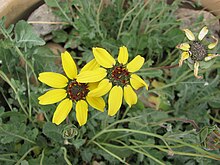Berlandiera
| Greeneyes | |
|---|---|

| |
| Berlandiera lyrata | |
| Scientific classification | |
| Kingdom: | Plantae
|
| (unranked): | Angiosperms
|
| (unranked): | |
| (unranked): | |
| Order: | |
| Family: | |
| Subfamily: | |
| Tribe: | |
| Genus: | Berlandiera |
| Type species | |
| Berlandiera texana | |
Berlandiera is a genus of flowering plants in the aster family, Asteraceae.[3]
The name honours explorer Jean-Louis Berlandier (1803–1851).[4] The genus is distributed in the United States and Mexico.[4] Species are known generally as greeneyes.[5][6]
Description[]
These are perennial herbs and subshrubs, sometimes with annual stems growing from a woody base or taproot. They are a few centimeters tall to well over a meter. The herbage is usually hairy and may be rough or soft in texture. The alternately arranged leaves have variously shaped blades that may be lobed or divided. The flower heads are solitary or borne in wide arrays. There are usually about 8 ray florets, but there may be 2 to 13 per head. They are yellowish on the upper surface but the undersides may be green, red, or maroon, or have darker veins. There are many disc florets in shades of yellow, red, or maroon. The fruit is a hairy black cypsela that is shed from the plant with the remnants of disc florets and phyllaries still attached to it.[4]
Species[]
- (Hook.) Small (B. texana × B. pumila) - Texas Louisiana Oklahoma
- Small - Florida
- Berlandiera lyrata Benth. – chocolate flower, chocolate daisy, lyreleaf greeneyes - Arizona New Mexico Texas Utah Oklahoma Kansas Colorado, Chihuahua, Coahuila, Durango, Jalisco, Nuevo León, San Luis Potosí, Tamaulipas, Zacatecas, Aguascalientes
- (A.Gray) M.E.Jones - Arizona New Mexico Texas
- Berlandiera monocephala (B. L. Turner) Pinkava - Arizona New Mexico Chihuahua, Sonora
- Berlandiera pumila (Michx.) Nutt. – soft greeneyes - Texas LA Oklahoma Arkansas Alabama Georgia Florida South Carolina North Carolina
- Berlandiera subacaulis (Nutt.) Nutt – Florida greeneyes - Florida
- Berlandiera texana DC. – Texas greeneyes - New Mexico Texas Oklahoma Kansas Missouri
References[]
- ^ "Berlandiera". Taxonomy. UniProt. Retrieved 2012-07-15.
- ^ Genus: Berlandiera DC. Archived 2014-02-01 at the Wayback Machine USDA Germplasm Resources Information Network (GRIN). Accessed 2012-07-15.
- ^ Candolle, Augustin Pyramus de. 1836. Prodromus systematis naturalis regni vegetabilis, sive, Enumeratio contracta ordinum generum specierumque plantarum huc usque cognitarium, juxta methodi naturalis, normas digesta 5: 517
- ^ a b c Berlandiera. Flora of North America, eFloras.org. Accessed 2012-07-15.
- ^ a b Berlandiera. Integrated Taxonomic Information System (ITIS).
- ^ Bour, Roger. Where and when was Jean Louis Berlandier born? - Notes on Jean Louis Berlandier. I. Bibliotheca Herpetologica, Vol. 12: 18–40, 2016.[1]
- ^ Flann, C (ed) 2009+ Global Compositae Checklist
- ^ "GRIN Species Records of Berlandiera". Germplasm Resources Information Network. United States Department of Agriculture. Archived from the original on 2015-09-24. Retrieved 2012-07-15.
- ^ Biota of North America Program, 2013 county distribution maps
External links[]
| Wikimedia Commons has media related to Berlandiera. |
| Wikispecies has information related to Berlandiera. |
- Berlandiera
- Flora of North America
- Asteraceae genera
- Heliantheae stubs